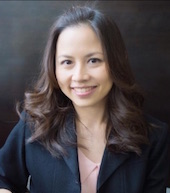 Tanavadee Khuvasanont
Tanavadee Khuvasanont
Counsellor (Economic and Investment)
Office of Economic and Investment Affairs,
Royal Thai Embassy in Tokyo
Young Leaders Program (’09)
Please tell us about your career path so far. What is your area of specialization and how did you come to work in this area? And what have been the most interesting or rewarding aspects of your career thus far?
I started working as a government official at the Thailand Board of Investment (BOI) after I graduated with a Masters of Science in Industrial and System Engineering from Virginia Tech in the U.S. under the Royal Thai Government Scholarship Program. My first task at BOI was to inspect the material and machinery utilization of the production line of BOI-promoted projects. A year later, I became project analyst dealing with interviewing and analyzing the feasibility studies of investment plans from both domestic and foreign investors.
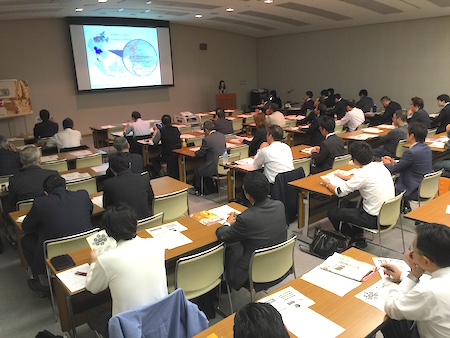
Tanavadee giving a presentation about investment opportunities in Thailand in Nagoya, November 2015
In 2008, the opportunity came up to study for another master’s degree in Public Policy at GRIPS, a field quite remote from my expertise. I feel that GRIPS has broadened my mind and vision especially from the government service point of view. After graduation from GRIPS, I joined the secretariat team of the Secretary General of BOI. I worked closely with the top management so I could learn various aspects from them. In 2015, I got assigned to work in the BOI Tokyo Office, which is the biggest overseas office of BOI. I am very glad to have been given this opportunity to come back to Japan again. My term in Japan will be approximately three years.
You are currently working as Counsellor in the Office of Economic and Investment Affairs at the Thai embassy in Tokyo. What are your main responsibilities and duties?
The BOI overseas offices act as first window for investors and it is our responsibility to facilitate their smooth business operations in Thailand. My major task here is to serve the Japanese investors in every aspect such as giving advice, updating them on the new Thailand investment schemes, providing the necessary information about investment in Thailand, responding to the special inquiries, and so on.
In Japan, the BOI office is under the umbrella of the Royal Thai Embassy so we work closely with the Ambassador’s economic team as well. Additionally, we also cooperate closely with alliance organizations such as JETRO and ASEAN-Japan Centre.
What are some of the biggest challenges you face in your work?
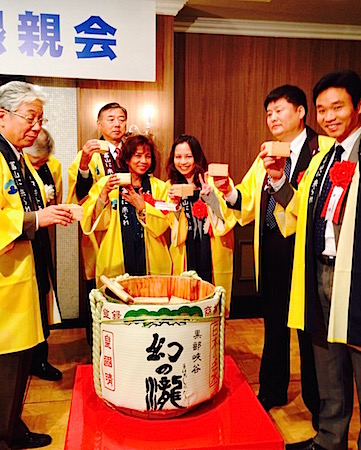
A sake hammering ceremony in Toyama, April 2015
Japan is the biggest country investing in Thailand so far. For many decades, the top Japanese manufacturing industries have established their subsidiaries in Thailand. However, with the recent slowdown of the Japanese and the world economy, our biggest challenge is to maintain the existing Japanese companies in Thailand and to introduce new Japanese investors to expand their investment both in manufacturing and service sectors in Thailand continuously.
In your current capacity, what do you see as the main opportunities and challenges for the Thailand – Japan relationship over the course of the next five to ten years?
In my opinion, the economic relationship between Thailand and Japan will remain the same. The opportunities for both countries will be increasingly in the services sector rather than in manufacturing. In the near future, the number of Thai tourists is expected to increase dramatically while Japanese yen continues to depreciate.
What led you to GRIPS? What was the most important thing you learned while here, and how has your experience at GRIPS prepared you for future endeavours?
I learned about GRIPS through the scholarship announcement on the BOI intranet and decided to apply. Even though I was engaged in a big project at that time, my supervisor and the executives of BOI fully supported my application for this scholarship program.
The most important thing I learned at GRIPS is to be more “open-minded”. I used to be a very solid type of person who, being trained as an engineer, gets the solution from formulas (e.g. 1+1 = 2). At GRIPS, I gradually learned how to adjust my thinking by sharing the knowledge and opinions (there are no right or wrong answers) with people from different countries and cultures around the world. Moreover, I think I could absorb some Japanese culture and the Japanese way of thinking, which has tremendously helped me in understanding Japanese investors and their ways of doing business. No doubt, this has been very helpful for my current task here in Japan.
What are some of your fondest memories of your time spent at GRIPS?
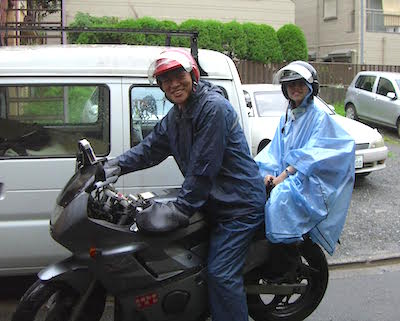
And off they go! At the back of Hashimoto-sensei’s motorbike to do interviews for her independent study.
When you asked this question, a lot of fond memories popped up in my mind. I could recall many smiley faces of wonderful friends, staff, and professors. Thinking about the all-year-round events throughout the four different seasons in Japan brings back a lot of fantastic memories. On the top of that, my fondest memory is perhaps about my independent study with my beloved advisor, Professor Hashimoto. He introduced me to the owners of Small and Medium Enterprises (SMEs) in Ota city. In order to conduct the interviews for my study, Professor Hashimoto generously set up appointments and offered me a ride to Ota city on his motorbike. It was a rainy day and I was actually very scared of motorbikes, but it’s one of my unforgettable memories in life!
What do you miss about Thailand and what do you like most about living in Tokyo? Has Tokyo changed since you completed the Young Leaders Program at GRIPS in 2009?
Well, Thailand and Japan are very close in distance. After I finished the Young Leaders Program at GRIPS in 2009, I visited Japan many times for business and sightseeing. For me, Tokyo is always an active city with its unique culture. Tokyo has been changing gradually over time as old buildings are being torn down and new structures put up. I like everything in Tokyo and other parts of Japan, especially various Japanese food, beautiful nature and its convenient transportation.
How do you maintain a balance between your work and the rest of your life? And what is your favorite thing to do when you are not working?
Compared to Bangkok, there is very little traffic in Tokyo and commuting is fast and efficient. I therefore spend many more hours at work here than I used to in Thailand. I work hard on weekdays, but at the same time, I enjoy my weekends very much. I like to go out for a walk or go on sightseeing trips on weekend either in Tokyo or elsewhere in the country.
If you could give one piece of advice to anyone considering studying at GRIPS what would it be?
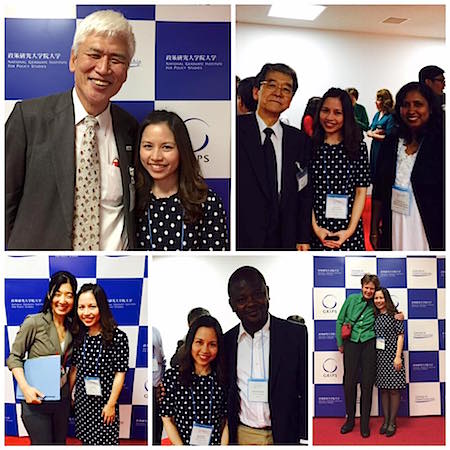
Catching up with old friends at the GRIPS Homecoming, September 2015
Even though the master’s programs at GRIPS are very intensive and might seem tough to finish within a year, it is worth to take a break in your career to fresh up your mind and knowledge here. Japan is a dream destination for the tourists, but being a student in Japan is much more interesting than being just a tourist. So, I would recommend everyone to check out the programs and grasp any opportunity to join our GRIPS community with both hands.
How would you like to maintain involved with the School? What do you expect from GRIPS as an alumnus?
Thanks to the GRIPS community I now have access to a worldwide network of personal and professional connections. It is very convenient to keep in touch with professors and friends through the social media (i.e. Facebook). I think GRIPS is doing well with the alumni network so far. I just attended the GRIPS Homecoming event in September 2015. I think it is very interesting to meet many alumni in that kind of event.





